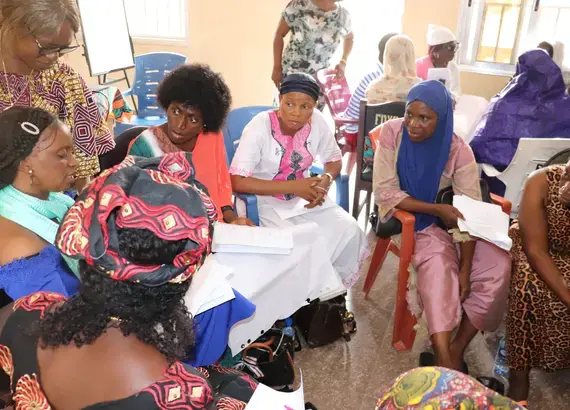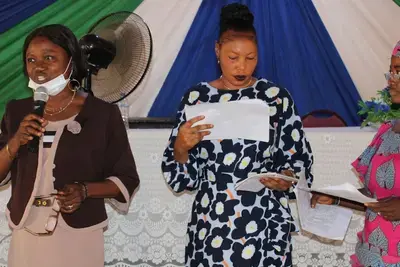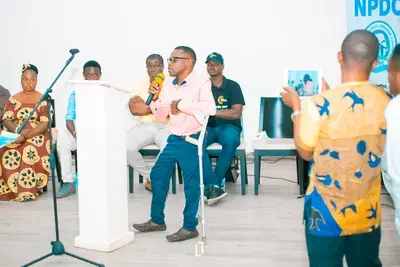
Success Story
Facilitating Historic Outcomes for Women in Sierra Leone
With the help of local partners, the National Democratic Institute (NDI) is working throughout Sierra Leone to prepare women to overcome traditional barriers to their political participation and ensure their voices are heard in Parliament and the country’s local councils. These efforts extend across the expanse of Sierra Leone’s distinct regions, including the rural northern district of Koinadugu. For much of the district’s history, it was taboo for a woman to inherit or purchase land, rent a house in her own name, stand for a political position, or speak in meetings. In over half a century of representation in the nation’s Parliament, not a single woman had ever represented the Koinadugu district.
Hawa Conteh has advocated on behalf of her community for decades and became Koinadugu’s first female Member of Parliament in June. While the obstacles she has witnessed to women’s leadership are not unique to Koinadugu, they remain as visible there as anywhere else in her country. Describing the challenges for women aspirants, she explains, “There are so many who search for political positions, but they are being intimidated by some males outside. Even their own very husbands. Some husbands do not want their wives to be part of the decision making process because they have a stereotyped way of thinking about women, that women should not be in the front, women should always be at the back. We also have our religious beliefs. For some religious leaders, they think women should always be at the back and not the front row. And even our cultural beliefs, our cultural beliefs also support the idea that women should not be at the front, they should be at the back, that women should not be in the decision-making bodies.”
These socio-cultural pressures have always made it difficult for women to seek and hold office in Sierra Leone. As of just last year, only 14.5% of elected seats in the national parliament were held by women MPs. However, the Gender Equality and Women’s Empowerment Act (GEWE), 2022, signed into law earlier this year, presented an unprecedented opportunity for change, establishing a 30 percent quota for women in elected and appointed political positions, as well as for women employees in larger corporate and nonprofit entities. Elizabeth Kallon, who just won a local councilor seat in Pujehun, described the impact of the legislation on her candidacy, “The 30% helped me a lot because I have gone for seats in council more than twice, but I could not have it. But this time around, because of the 30% quota, I was fortunate enough to become a counselor.”
To support the consolidation of democracy in Sierra Leone, NDI partnered with public institutions – Ministry of Social Welfare, Gender, and Children's Affairs; Electoral Commission for Sierra Leone; Political Parties Regulation Commission; and All Political Parties Womens’ Association – to prepare aspirant women for the grueling process of gaining nomination and running a political campaign. Alongside efforts by political parties and local organizations, NDI organized large-scale training and informational sessions across Sierra Leone to help prepare women for the challenge of assuming office, as well as to raise public support for women’s candidacy in the runup to the election.
One of the core purposes of the trainings for women aspirants and candidates was to help them fully understand the 2023 electoral process and the implications of newly passed legislation- information that many of them had not previously been privy to. Training sessions were used to prepare women to run a functional campaign, covering topics such as the mobilization of resources, building a supporter base and effectively utilizing the party structure. Over 250 women took part in NDI’s training sessions, with many going on to win their races with the help of the lessons and guidance provided there.
Hon. Kallon explained that the training helped build her skills in public speaking, to speak more freely and to develop the confidence necessary to take charge of her campaign. “The training helps us to build our confidence, to mobilize people around our community, to be able to know that women should be in front and not at the back.” Hon. Conteh reflected similar sentiments, explaining, “The training at that time was very, very useful and timely for all of us, especially me, because there are so many things that came up that helped me so much during the campaign.” She went on to emphasize the importance of sessions on campaign strategy, noting in particular the lessons on fundraising, which helped her to take large steps. When asked if she believed similar trainings would be needed in the future, she responded emphatically, “There are some women who do not know their potential, but in the training sessions, those women can manifest their capacity as a leader.”
Hon.Conteh was just one of the 41 women who won their races for Parliament in the June 24th elections, by far the country’s most ever. Now, 28.2% of the legislative body is made up of women, doubling the count from just a year ago. Though such a degree of change in one electoral cycle is astonishing, it only represents the start of a longer process of integrating women into the country’s political environment. The road forward for women in Sierra Leonean politics will not be straightforward or easy, but the doors in the way of progress have begun to creak open. NDI’s efforts in the country will continue seeking to open those doors even wider so that Sierra Leone’s next generation of women politicians can make their voices heard.


